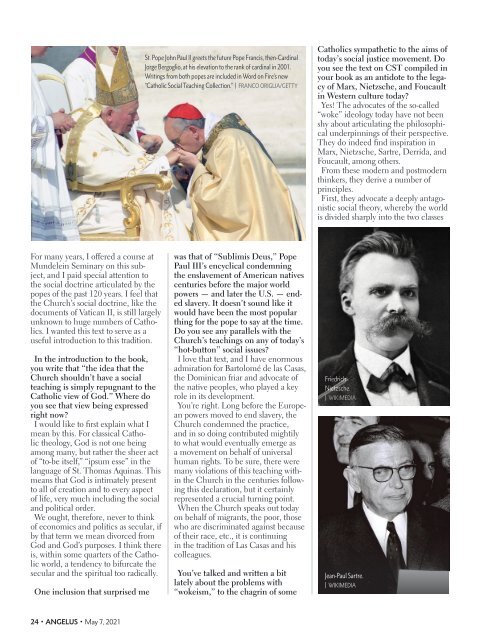You also want an ePaper? Increase the reach of your titles
YUMPU automatically turns print PDFs into web optimized ePapers that Google loves.
St. Pope John Paul II greets the future Pope Francis, then-Cardinal<br />
Jorge Bergoglio, at his elevation to the rank of cardinal in 2001.<br />
Writings from both popes are included in Word on Fire’s new<br />
“Catholic Social Teaching Collection.” | FRANCO ORIGLIA/GETTY<br />
Catholics sympathetic to the aims of<br />
today’s social justice movement. Do<br />
you see the text on CST compiled in<br />
your book as an antidote to the legacy<br />
of Marx, Nietzsche, and Foucault<br />
in Western culture today?<br />
Yes! The advocates of the so-called<br />
“woke” ideology today have not been<br />
shy about articulating the philosophical<br />
underpinnings of their perspective.<br />
They do indeed find inspiration in<br />
Marx, Nietzsche, Sartre, Derrida, and<br />
Foucault, among others.<br />
From these modern and postmodern<br />
thinkers, they derive a number of<br />
principles.<br />
First, they advocate a deeply antagonistic<br />
social theory, whereby the world<br />
is divided sharply into the two classes<br />
For many years, I offered a course at<br />
Mundelein Seminary on this subject,<br />
and I paid special attention to<br />
the social doctrine articulated by the<br />
popes of the past 120 years. I feel that<br />
the Church’s social doctrine, like the<br />
documents of Vatican II, is still largely<br />
unknown to huge numbers of Catholics.<br />
I wanted this text to serve as a<br />
useful introduction to this tradition.<br />
In the introduction to the book,<br />
you write that “the idea that the<br />
Church shouldn’t have a social<br />
teaching is simply repugnant to the<br />
Catholic view of God.” Where do<br />
you see that view being expressed<br />
right now?<br />
I would like to first explain what I<br />
mean by this. For classical Catholic<br />
theology, God is not one being<br />
among many, but rather the sheer act<br />
of “to-be itself,” “ipsum esse” in the<br />
language of St. Thomas Aquinas. This<br />
means that God is intimately present<br />
to all of creation and to every aspect<br />
of life, very much including the social<br />
and political order.<br />
We ought, therefore, never to think<br />
of economics and politics as secular, if<br />
by that term we mean divorced from<br />
God and God’s purposes. I think there<br />
is, within some quarters of the Catholic<br />
world, a tendency to bifurcate the<br />
secular and the spiritual too radically.<br />
One inclusion that surprised me<br />
was that of “Sublimis Deus,” Pope<br />
Paul III’s encyclical condemning<br />
the enslavement of American natives<br />
centuries before the major world<br />
powers — and later the U.S. — ended<br />
slavery. It doesn’t sound like it<br />
would have been the most popular<br />
thing for the pope to say at the time.<br />
Do you see any parallels with the<br />
Church’s teachings on any of today’s<br />
“hot-button” social issues?<br />
I love that text, and I have enormous<br />
admiration for Bartolomé de las Casas,<br />
the Dominican friar and advocate of<br />
the native peoples, who played a key<br />
role in its development.<br />
You’re right. Long before the European<br />
powers moved to end slavery, the<br />
Church condemned the practice,<br />
and in so doing contributed mightily<br />
to what would eventually emerge as<br />
a movement on behalf of universal<br />
human rights. To be sure, there were<br />
many violations of this teaching within<br />
the Church in the centuries following<br />
this declaration, but it certainly<br />
represented a crucial turning point.<br />
When the Church speaks out today<br />
on behalf of migrants, the poor, those<br />
who are discriminated against because<br />
of their race, etc., it is continuing<br />
in the tradition of Las Casas and his<br />
colleagues.<br />
You’ve talked and written a bit<br />
lately about the problems with<br />
“wokeism,” to the chagrin of some<br />
Friedrich<br />
Nietzsche.<br />
| WIKIMEDIA<br />
Jean-Paul Sartre.<br />
| WIKIMEDIA<br />
24 • ANGELUS • <strong>May</strong> 7, <strong>2021</strong>


















